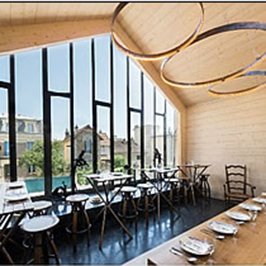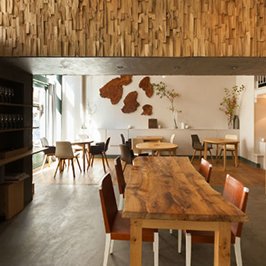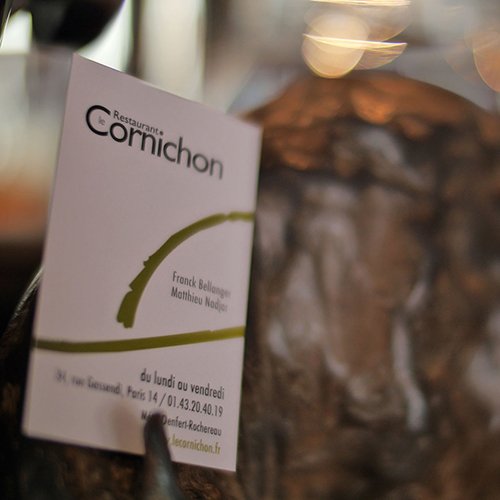- ##CopainsCommeCochon
- #Basque
- #Bistronomie
- #BrittonChef
- #Charity
- #Creativity
- #HumaniticAndFair
- #MotherTeresaOfFood
- #RefugeeFoodFestival
- #Soup
Bistronomie or Haute Bistro : the low-key and friendly atmosphere of a bistro with the high quality of haute gastronomy. Chef Stéphane Jégo has been practising this mix since he opened his restaurant L’Ami Jean (Paris, 7th arrondissement). While one of the goals of this movement is to make good, well-cooked products affordable, Stéphane Jégo is also using it to favor the social inclusion of people in distress.
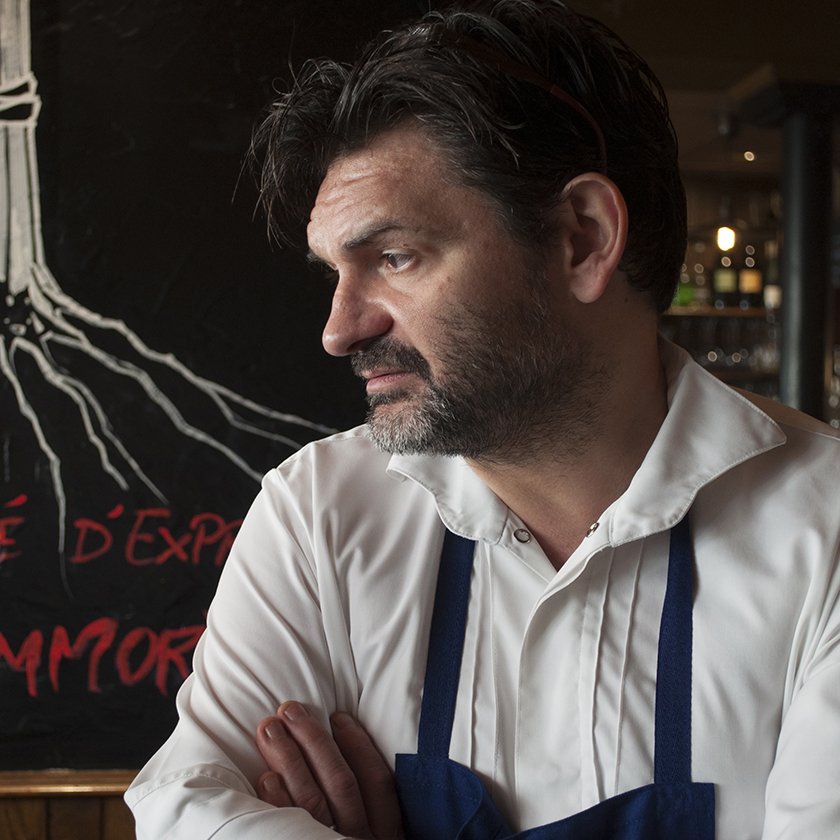
Stéphane Jégo was hired at restaurant La Régalade as soon as it opened, in 1992, and he learned a lot there. In his twelve years of service along his « second father » Chef Yves Camdeborde, he took an active part in the birth of bistronomie.
In 2004, when Britton Stéphane Jégo decided to fly solo and take over L’Ami Jean, the oldest Basque establishment in Paris, he kept « the soul and warmth of the place.» He offers « the same products, from the same suppliers, as those of Michelin-starred restaurants, but cooked and served with more freedom, in a more creative and independent way. » In a word, Stéphane Jégo brings together simpleness and quality to « make excellence affordable. »
Cooking as a social connector

Affordability for the clients, and access and inclusion for those in need, as he uses cooking as a way to open to others. « Cooking is an universal language, very useful to comunicate simply, most notaby with people in distress. »
For Stéphane Jégo, this language allows to « offer one’s skills and make them available to people in distress, who need to eat, of course, but who also need to share and enjoy. »
Chef Stéphane Jégo has helped French charity Secours Populaire, for instance. «I helped them discover good products, showed them how best to use them and how to cook them, gave a few tips and advice, and above all we shared the meal we had prepared together », is how he describes a cooking class with beneficiaries of the NGO.
Refugee Food Festival, duo with a Syrian Chef
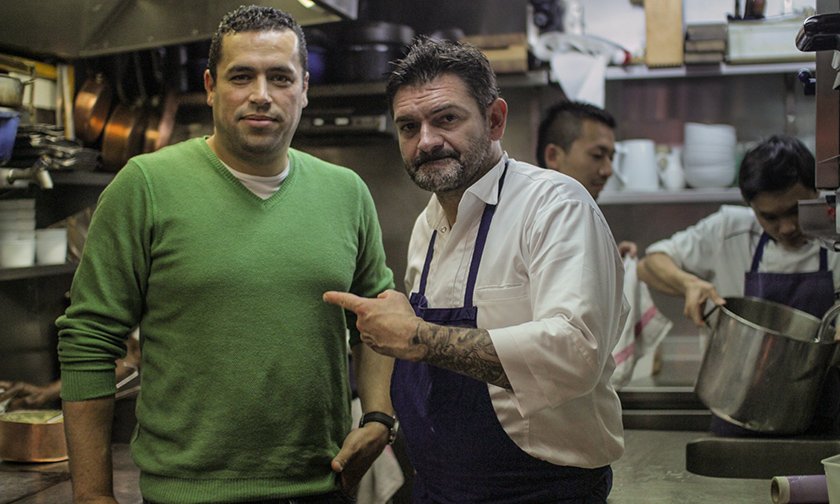
Stéphane Jégo was also involved with the first Refugee Food Festival, held in Paris last June, on the occasion of the World Refugee Day. What prompted him to do so was the opportunity « to at last shed a positive light on this tragedy. »
He welcomed Mohamad Elkhaldy to his kitchen for two four-hands sessions. This Syrian chef was forced to flee Damascus, leaving behind his two restaurants, his cooking school and TV cooking shows.
Stéphane and Mohamad, both passionate about cooking, met and communicated easily, undeterred by the language barrier, and energized by each other’s creativity and enthusiasm.
They thought up a menu mixing French and Syrian cuisines: kibbeh nayeh lamb tartar with smoked eel, courgettes in yoghurt stuffed with Galicia beef, pigeon with freekeh risotto; gum arabic ice cream, etc.
The experience allowed Stéphane Jégo to discover the professional and personal qualities of another Chef. « Apart from this political and humanitarian tragedy, we must not forget humans and their immense competencies. I am very proud to have been able to showcase Mohamad’s culinary talents. And I must say it has also been extremely beneficial to me. It is always enriching to discover another culture, new techniques, new products, new tastes. »
Stéphane Jégo’s public, and sometimes publicised commitments, would mean nothing if they were not matched by the same generosity in his restaurant, every day. He is indeed « the Mother Teresa of food » as his wife sometimes mockingly calls him.
Humanistic and fair, everyday
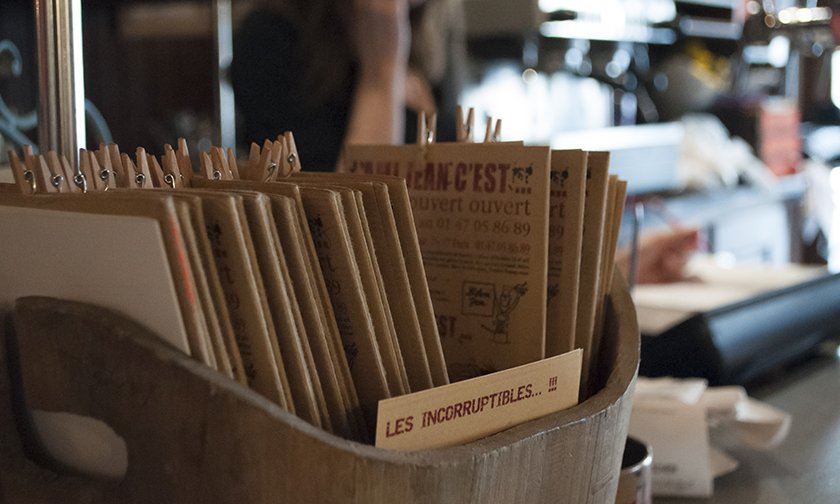
For this Chef, « respecting people is essential. »
Partly because he suffered harsh treatments in his years as a training cook, he wants to treat his apprentices right. « with these kids who come and work at L’Ami Jean for 2 to 4 years, we choose each other. They come and work for two days, and then they get a day off. After those 3 days, we sit down and talk – does he / she want to go on ?Am I ready to take them on ? If the answers are yes, I will invite his / her parents to eat and talk, to reasure them and make sure this is a family and collective decision. They are my kids ! »
These kids, along with the other kitchen staff and the dining room teams, are like an extended global family. Yuji, the deputy Chef, is Japanese, Boulay, a cook, is from Mali, apprentice Théo is from Vietnam, head waiter Mario is Romanian, etc. As Stéphane Jégo likes to say « what we do is manual work – speaking good French is not esential. What matters is gestures – passing knowledge by touch and feel. I do not want to give my staff mere tricks and recipes but a state of mind : they must work by and for themselves, they must build their own freedom. »
And the client too is free ! Free to discover L’Ami Jean’s, or rather Stéphane Jégo’s friends’ restaurants.
You can find a list of 15 of these right next to the dessert menu, and they are everywhere from Paris to the Basque country. « These are not competitors, they are friends. We share the same passion for Bistronomie. And we are actually about to unite even more visibly using the hashtag #CopainsCommeCochon (thick as thieves) to spread the movement! Coking is a key element to the growth of French presence worldwide, and we plan to participate actively. »
Foodies of the world, Stéphane Jégo and his friends await you to help you discover a generous and genuinely French cuisine : bistronomie !
- 1931 : L’Ami Jean, Basque restaurant, opened in Paris
- 1971 : birth of Stéphane Jégo, in Brittany, France
- 1992 : joined La Régalade, along Chef Yves Camdeborde
- 2002 : took over L’Ami Jean
- 21 juin 2016 : took part in the first Refugee Food Festival

Find the recipe



